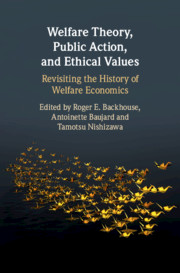Book contents
- Welfare Theory, Public Action, and Ethical Values
- Welfare Theory, Public Action, and Ethical Values
- Copyright page
- Contents
- Figures and Tables
- Contributors
- Acknowledgements
- Introduction: Revisiting the History of Welfare Economics
- Part I Plurality of Welfare in the Making of Welfare Economics
- Part II Developing Modern Welfare Economics
- 7 John Hicks’s Farewell to Economic Welfarism
- 8 Individualism and Ethics
- 9 Non-welfarism in the Early Debates over the Coase Theorem
- 10 Musgrave and the Idea of Community
- 11 Non-welfaristic Features of Kenneth Arrow’s Idea of Justice
- 12 Beyond Welfarism
- 13 The Influence of Sen’s Applied Economics on His Non-welfarist Approach to Justice
- 14 Conclusion
- Index
- References
9 - Non-welfarism in the Early Debates over the Coase Theorem
The Case of Environmental Economics*
from Part II - Developing Modern Welfare Economics
Published online by Cambridge University Press: 04 March 2021
- Welfare Theory, Public Action, and Ethical Values
- Welfare Theory, Public Action, and Ethical Values
- Copyright page
- Contents
- Figures and Tables
- Contributors
- Acknowledgements
- Introduction: Revisiting the History of Welfare Economics
- Part I Plurality of Welfare in the Making of Welfare Economics
- Part II Developing Modern Welfare Economics
- 7 John Hicks’s Farewell to Economic Welfarism
- 8 Individualism and Ethics
- 9 Non-welfarism in the Early Debates over the Coase Theorem
- 10 Musgrave and the Idea of Community
- 11 Non-welfaristic Features of Kenneth Arrow’s Idea of Justice
- 12 Beyond Welfarism
- 13 The Influence of Sen’s Applied Economics on His Non-welfarist Approach to Justice
- 14 Conclusion
- Index
- References
Summary
Though economists typically eschewed non-welfarist arguments in the post-WWII period, there is at least one prominent instance in which such arguments were very much in play, both directly and as underpinnings for welfare-related arguments: The debate over the Coase theorem. This debate saw the Coase theorem regularly challenged on both welfarist (efficiency) and non-welfarist grounds. This then raises the question of what it was about the Coase theorem that led economists into this non-welfarist territory. This essay revisits the early debates over the Coase theorem, where non-welfarist arguments featured prominently, in order to bring out the nature of those arguments and attempt to understand the rationale(s) for their deployment. As we shall see, this move was a function of forces internal and external to economics, including the environmental turn in society and the profession, a concern with issues of fairness and equity in the evaluation of how to resolve externality problems, and a view, prominent in certain quarters, that the environment and environmental preservation is an end in itself.
Keywords
- Type
- Chapter
- Information
- Welfare Theory, Public Action, and Ethical ValuesRevisiting the History of Welfare Economics, pp. 208 - 231Publisher: Cambridge University PressPrint publication year: 2021
References
- 3
- Cited by

